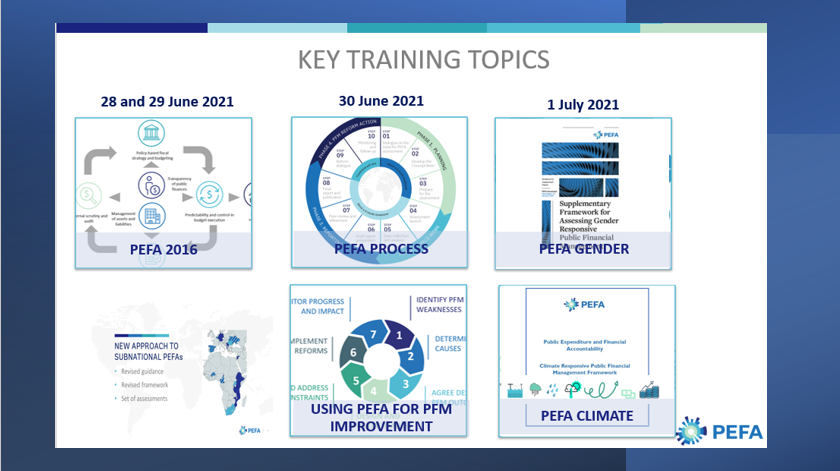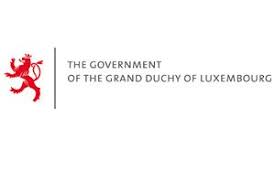PEFA 20 ANNIVERSARY

The year 2020 was exciting, to be remembered with numerous PEFA events and celebrations! It was the year of the PEFA 20 Anniversary! The season started with the launch of the Global Report, followed by virtual trainings, events, publications, and finished with the Anniversary celebration during the PEFA Conference on PFM, showing PEFA 20 year's journey as well as discussing the role of PFM in sustainable, green and inclusive development. All details could be found below.
Click on the 20 Years video to watch the accomplishments of PEFA:


VIRTUAL CONFERENCE CELEBRATING 20 YEARS OF PEFA
The PEFA virtual conference on December 1 and 2 looked back at the journey PEFA has had as a gold standard PFM diagnostic tool over the last 20 years, discussed why and how PFM matters more than ever in tackling climate change, addressing gender equality and building more inclusive services in the recovery from the COVID-19, explored what PFM community could do differently to address the new policy and delivery challenges through PFM. The PEFA e-learning course was launched and during the PEFA Marketplace the new PEFA products were highlighted.
The event was in English with simultaneous translation in French and Spanish! Links are provided below:
OVERVIEW LEAFLET WITH AGENDA AND SPEAKERS
RESUMEN Y AGENDA – Español APERÇU ET AGENDA - Français
VIDEO RECORDINGS:

OTHER EVENTS CELEBRATING 20 YEARS OF PEFA
![]() Building effective procurement systems: the complementarities of MAPS and PEFA Tools. Joint Webinar by MAPS and PEFA, September 28, 2021
Building effective procurement systems: the complementarities of MAPS and PEFA Tools. Joint Webinar by MAPS and PEFA, September 28, 2021
![]() Table Ronde en Français: L’impact du PEFA sur la réforme de la gestion des finances publiques : expériences de pays francophones - 20 ans du PEFA, le 23 septembre 2021
Table Ronde en Français: L’impact du PEFA sur la réforme de la gestion des finances publiques : expériences de pays francophones - 20 ans du PEFA, le 23 septembre 2021
The PEFA Events celebrating the 20th Anniversary have been organized since January 2021. Their role was to communicate with PEFA community and engage the public and variety of policy and development actors with an interest on PFM issues.
The events include launching of new PEFA developments and promoting new achievements, initiating discussions on interesting PFM topics and providing trainings for variety of PEFA users. Check the completed events in 2021: READ MORE

Thank you for following us on PEFA Social media to learn more about PEFA activities, what former Heads of PEFA Secretariat share about PEFA program, presented experiences and success stories from using PEFA around the world, quotes from global leaders on the application of PEFA, interesting facts about PEFA, published Reports and more details about all events and publications! Stay tuned in the New Year 2022!
For more information contact PEFA Secretariat at: services@pefa.org
MORE ABOUT PEFA

PEFA Program
The PEFA Secretariat is hosted by the World Bank in Washington DC. Since 2001, five phases of the Program have been implemented by PEFA Secretariat with the continuous support and guidance from the PEFA Partners. Seven Heads of PEFA Secretariat have led the Program and 20 staff members have contributed with their knowledge and professional experience.
Learn more about the milestones during the five phases of the PEFA Program from PEFA History Page.
Watch a short PEFA 20 Years Video highlighting PEFA journey from 2001 until 2021.

The conversation between the former Heads of PEFA secretariat Mr. Richard Allen and Mrs. Nicola Smithers and the current Head Mr. Srinivas Gurazada are highlighting the initial goals and objectives of the PEFA program and the achieved results over the past 20 years, also presenting some expectations for PEFA's Future.



PEFA Partners
The PEFA Program was established in 2001 by seven partners: The European Commission, International Monetary Fund, World Bank, and the governments of France, Norway, Switzerland, and the United Kingdom. In 2019, the Ministries of Finance of the Slovak Republic and the Grand Duchy of Luxembourg joined the program. The PEFA partners support the PEFA program with resources and provide strategic guidance on its implementation.
See details of the Partners at the end of this page.
Check some key highlights from recent PEFA Steering Committee meetings.
December 2020

December 2019


PEFA Success Stories
The PEFA Assessments are undertaken by the governments from all over the world. For the last 20 years PEFA assessment methodology has been applied more than 670 times at the national and subnational levels in 154 countries.
Below, you can review examples where governmental representatives share their experiences on using PEFA assessments to inform their PFM reforms:
PEFA Videos
Learn more about the application of PEFA 2016 Methodology in different countries:

Country experiences at National levels:
![]() Using PEFA: Millennium Challenge Corporation
Using PEFA: Millennium Challenge Corporation
![]() Experience from applying PEFA in The Gambia
Experience from applying PEFA in The Gambia
![]() Experience from applying PEFA in Lao PDR
Experience from applying PEFA in Lao PDR
![]() Experience from applying PEFA in Georgia
Experience from applying PEFA in Georgia
![]() PEFA Stories: Cameroon and Togo
PEFA Stories: Cameroon and Togo
![]() Atelier d'Evaluation de la gestion des finances publiques basées sur le PEFA Senegal
Atelier d'Evaluation de la gestion des finances publiques basées sur le PEFA Senegal
Country experiences at Sub-national levels:
![]() PEFA applied in four German Municipalities
PEFA applied in four German Municipalities
![]() PEFA 2018 - El Municipio de La Paz
PEFA 2018 - El Municipio de La Paz
First application of the pilot Climate Framework in Samoa:
![]() Pilot PEFA Assessment - Climate Module for Samoa
Pilot PEFA Assessment - Climate Module for Samoa
PEFA Stories READ MORE

Learn more about PEFA Products
PEFA Products
The PEFA Assessment Framework with its updates in 2011 and 2016 is the main product of PEFA Program. It has became a recognized standard for assessing the strengths and weaknesses of PFM system performance. The framework is now available in 10 languages.

The PEFA Handbook in four volumes gives guidance to governments and assessors in the use of the framework.
The supplementary Gender and Climate Modules and the enhanced Sub-national Governments Framework with service delivery module have also been developed to ensure that PEFA meets the changing needs of its users.
Most of PEFA Products are available in 3 or 4 languages.
Check more details on the PEFA products in the PEFA Program Flyer:

PEFA Mobile Guidance
The PEFA Framework and the PEFA Guidance on: The PEFA Assessment Process, The PEFA Assessment Fieldguide and Using PEFA for PFM improvement are now available for PEFA Clients as Mobile documents. Try them on your Mobile devices.

Users of PEFA Products
Assessment teams, governments and development partners all over the world are using the PEFA framework for assessing the countries' PFM Systems. The findings often feed into stakeholder dialog to develop and sequence PFM reform improvements.


PEFA Learning Program
PEFA Trainings
Since the publication of the first PEFA Framework in 2005, the interest in the methodology and it’s application on national and sub-national levels is increasing. In order to provide information and guidance to all PEFA users, the PEFA secretariat is organizing training in 3 languages (English, French and Spanish). The latest sessions were delivered virtually for four days in June and July 2021.Check the highlights, topics and details of the trainings:

PEFA Regional events
Upon request from governments or partners, regional and country specific workshops and trainings are provided on the guidance and methodologies. Regular webinars and workshops covering the latest trends in PFM provide opportunities for fruitful discussions with interesting panelists and deep analysis on the impact of PEFA.

PEFA Open Houses
Open Houses are organized once per year to update the PEFA Community on the latest products and achievements of PEFA Program.
As a result of the COVID-19 all learning events are delivered online.

During the last few years on average 60 learning events have been organized per year and more than 20,000 experts have been trained over the last 20 years.
PEFA Online Learning
A self paced e-learning course has been developed and soon will be available for all PEFA users.


PEFA Data
PEFA Assessments Data
The data has been collected for 20 years and has always been of great interest to PFM researchers and experts.
With the new PEFA website, created in 2019, information of the status, type and availability of all PEFA assessments can be found on the Assessments Portal.
The clients can easily use the filters and extract the full list of assessments or choose according regions, countries, methodologies and years. The scores of all public reports are downloadable in excel format from Scores Download and can be seen in the View Summary of every published PEFA Assessment.

Global Report on PFM
In order to provide analysis on the Public Financial Management (PFM) trends based on PEFA data, the Global PFM Report 2020 was launched in February 2021. It is an online document and contains summary of data and visualizations, accompanied by short analyses and country examples. It will be available annually in English, French and Spanish. The first issue of the report includes examples form Argentina, Ethiopia, Ukraine and West Bank and Gaza.
SDG Data
The PEFA Secretariat is supporting the UN SDG Initiative through the project: “Enhanced PEFA data collection of the UN Sustainable Development Goal Indicator 16.6.1 on budget credibility”. It is the owner of the SDG Indicator 16.1.1. “Primary government expenditures as a percentage of original approved budget”, which is a part of the Target 16: "Peace, Justice and Strong Institutions". PEFA is in charge of data collection and reporting to the United Nations Department of Economic and Social Affairs through the World Bank Data Department.

The project started in 2018. In 2021 the database contains information for 154 countries with provided data on average for 10 years from each country.
The collected data is published on the World Bank Portal


















